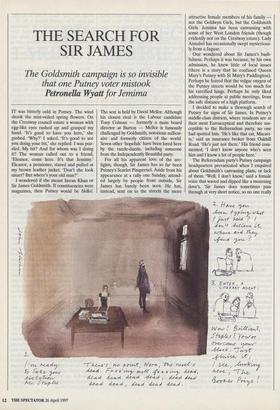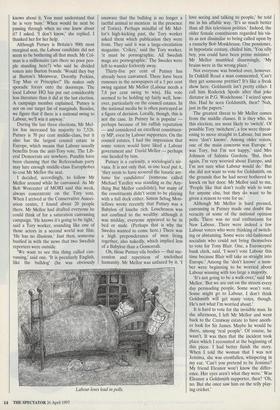THE SEARCH FOR SIR JAMES
The Goldsmith campaign is so invisible
that one Putney voter mistook Petronella Wyatt for Jemima
IT was bitterly cold in Putney. The wind shook the mist-veiled spring flowers. On the Crestway council estate a woman with egg-like eyes rushed up and grasped my hand. 'It's good to have you here,' she gushed. 'Why?' I asked. 'It's good to see you doing your bit,' she replied. I was puz- zled. My bit? And for whom was I doing it? The woman called out to a friend, `Eleanor, come here. It's that Jemimy.' Eleanor, a pensioner, stared and pulled at my brown leather jacket. 'Don't she look smart? But where's your old man?'
I wondered if she meant Imran Khan or Sir James Goldsmith. If constituencies were magazines, then Putney would be Hello!.
The seat is held by David Mellor. Although his closest rival is the Labour candidate Tony Colman — formerly a main board director at Burton — Mellor is famously challenged by Goldsmith, notorious million- aire and formerly citizen of the world. Seven other 'hopefuls' have been lured here by the razzle-dazzle, including someone from the Independently Beautiful party.
For all his apparent love of the arc- lights, though, Sir James has so far been Putney's Scarlet Pimpernel. Aside from his appearance at a rally one Sunday, attend- ed largely by people from outside, Sir James has barely been seen. He has, instead, sent on to the streets the more attractive female members of his family not the Goldwyn Girls, but the Goldsmith Girls. Jemima has been canvassing with some of her West London friends (though evidently not on the Crestway estate). Lady Annabel has occasionally swept mysterious- ly from a Jaguar.
One wondered about Sir James's bash- fulness. Perhaps it was because, by his own admission, he knew little of local issues (there is a story that he confused Queen Mary's Putney with St Mary's Paddington). Perhaps he feared that the vulgar oxygen of the Putney streets would be too much for his rareified lungs. Perhaps he only liked addressing people at public meetings, from the safe distance of a high platform.
I decided to make a thorough search of Putney for signs of Sir James. In Putney's middle-class districts, where residents are at their most Eurosceptical and therefore sus- ceptible to the Referendum party, no one had spotted him. 'He's like that cat, Macavi- ty,' said an insurance broker from Oakhill Road. 'He's just not there.' His friend com- mented, 'I don't know anyone who's seen him and I know a lot of people here.'
The Referendum party's Putney campaign headquarters prevaricated when I enquired about Goldsmith's canvassing plans, or lack of them. 'Well, I don't know,' said a female voice that waved and dipped like a mourning dove's. 'Sir James does sometimes pass through at very short notice, so no one really knows about it. You must understand that he is very busy.' When would he next be passing through when no one knew about it? I asked. 'I don't know,' she replied. I thanked her for her help.
Although Putney is Britain's 90th most marginal seat, the Labour candidate did not seem to be bothering all that much. Mr Col- man is a millionaire (are there no poor peo- ple standing here?) who said he divided voters into Burton brands: 'Would they buy at Burton's Menswear, Dorothy Perkins, Top Man or Principles?' He makes only sporadic forays onto the doorsteps. The local Labour HQ has put out considerably less literature than it did at the last election. A campaign member explained, 'Putney is not on our target list of marginals. Besides, we figure that if there is a national swing to Labour, we'll win it anyway.'
During the last three elections, Mr Mel- lor has increased his majority to 7,526. Putney is 70 per cent middle-class, but it also has the largest council estate in Europe, which means that Labour usually benefits from the anti-Tory vote. The Lib- eral Democrats are nowhere. Pundits have been claiming that the Referendum party may lure enough middle-class Europhobes to cost Mr Mellor the seat.
I decided, accordingly, to follow Mr Mellor around while he canvassed. As Mr Bob Worcester of MORI said this week, always concentrate on the Tory vote. When I arrived at the Conservative Associ- ation centre, I found about 20 people there. Mr Mellor had drafted everyone he could think of for a saturation canvassing campaign. 'He knows it's going to be tight,' said a Tory worker, sounding like one of those actors in a second world war film. `He has no illusions.' Just then, someone bustled in with the news that two Swedish reporters were outside.
`We want to see this thing called can- vassing,' said one. 'It is peculiarly English, like the bulldog' (he was obviously unaware that the bulldog is no longer a tactful animal to mention in the presence of Tories). Perhaps mindful of Mr Mel- lor's high-kicking past, the Tory worker asked them which publication they were from. They said it was a large-circulation magazine. 'Crikey,' said the Tory worker, `it must be pornographic. All Swedish mags are pornographic.' The Swedes were left to wander forlornly away.
Thirty-five per cent of Putney has already been canvassed. There have been rumours in the newspapers of a 5 per cent swing against Mr Mellor (Labour needs a 7.8 per cent swing to win). His vote seemed to be holding up fairly well, how- ever, particularly on the council estates. In the national media he is often portrayed as a figure of derision. Locally, though, this is not the case. In Putney he is popular perhaps because of his raffish reputation — and considered an excellent constituen- cy MP, even by Labour supporters. On the council estates, I had the impression that some voters would have liked a Labour government and David Mellor — perhaps one headed by him.
Putney is a curiosity, a sociologist's nir- vana. It is not only that, as one local put it, `they seem to have scoured the lunatic asy- lums for candidates' (someone called Michael Yardley was standing as the Any- thing But Mellor candidate), but many of the constituents didn't seem to be playing with a full deck either. Simon Sebag Mon- tefiore wrote recently that Putney was a Babylon of louche rich. Loucheness was not confined to the wealthy: although it was midday, everyone appeared to be in bed or nude. (Perhaps that is why the Swedes wanted to come here.) There was a high preponderance of men living together, also nakedly, which implied less of a Babylon than a Gomorrah.
Oh, those Putney vile bodies — that suc- cession and repetition of unclothed humanity. Mr Mellor was unfazed by it. 'I Labour loses lead in polls. love seeing and talking to people,' he told me in his affable way. 'It's so much better than all this television politics.' Indeed, the older female constituents regarded his vis- its as not dissimilar to being called upon by a raunchy Bob Monkhouse. One pensioner, in hypostatic ecstasy, chided him, 'You silly boy, you could have been prime minister.' Mr Mellor mumbled disarmingly, 'My brains were in the wrong place.'
Not everyone was bowled over, however. In Oakhill Road a man commented, 'Can't they get someone prettier? It's like a freak show here. Goldsmith isn't pretty either. I call him Roderick Spode after that joke dictator in P.G. Wodehouse.' I seized upon this. Had he seen Goldsmith, then? Isiah, just in the papers.'
The greatest threat to Mr Mellor comes from the middle classes. It is they who, in this election, are most likely to 'switch'. Of possible Tory `switchers', a few were threat- ening to move straight to Labour, but most were 'don't knows'. Among older voters, one of the main concerns was Europe. 'I was Tory, but I'm not happy,' said Mrs Johnson of Salonia Gardens. 'But, then again, I'm very worried about Europe, and I'm not sure what Labour would do.' But she did not want to vote for Goldsmith, on the grounds that he had never bothered to knock on her door. Mr Mellor said to me, `People like that don't really wish to vote for anyone else, but they do want to be given a reason to vote for us.'
Although Mr Mellor is hard pressed, canvassing in Putney made one doubt the veracity of some of the national opinion polls. There was no real enthusiasm for New Labour. There were indeed a few Labour voters who were thinking of switch- ing or abstaining. Some were old-fashioned socialists who could not bring themselves to vote for Tony Blair. One, a Eurosceptic bank clerk, said, 'I won't vote Labour this time because Blair will take us straight into Europe.' Among the 'don't knows' a num- ber were beginning to be worried about Labour winning with too large a majority.
`It's not going to be a walk-over,' said Mr Mellor. 'But we are out on the streets every day persuading people. Some won't vote. Some might go to Labour. I don't think Goldsmith will get many votes, though. He's not what I'm worried about.'
It is hard to vote for the invisible man. In the afternoon, I left Mr Mellor and went back to the Crestway estate to have anoth- er look for Sir James. Maybe he would be there, among 'real people'. Of course, he wasn't. It was then that the incident took place which I recounted at the beginning of this piece. I had better finish the story. When I told the woman that I was not Jemima, she was crestfallen, whispering in my ear, 'Can't you pretend to be Jemima? My friend Eleanor won't know the differ- ence. Her eyes aren't what they were.' Was Eleanor a Goldsmith supporter, then? 'Oh, no. But she once saw him on the telly play- ing cricket.'



































































 Previous page
Previous page